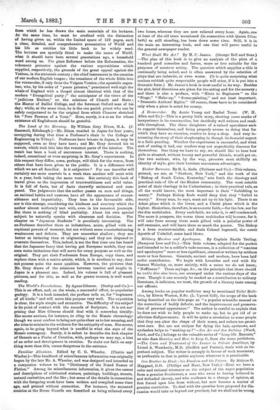Military Maxims and Apothegms. By Captain Bartle Teeling. (Sampson Low
and Co.)—This little volume, adapted for the pocket and intended to be a soldier's vade-mecum, is a collection of " maxims and apothegms" more or less significant, uttered or written by soldiers more or less famous. Generals, ancient and modern, have been laid under contribution. We begin with Leonidas and end with Sir Garnet Wolseley, or, more strictly, with a name we do not know, " Hoffbaner." These sayings, &c., on the principle that there should be millet dies sine linen, are arranged under the various days of the year. Though it can scarcely be ranked as a contribution to military literature, it indicates, we trust, the growth of a literary taste among our officers.
Among books on popular medicine may be mentioned Toilet Medi- cine, by Edwin Wooten, B.Sc. (L. Upcott Gill), the scope of the book being described on the title-page as " a popular scientific manual on the correction of bodily defects, and the improvement and preserva- tion of personal appearance." The anther is careful to explain that he does not wish to help people to make up, but to get rid of or alleviate disfigurements. It will be quite a revelation to some people that they can alter the shape of their noses, and reduce too promi- nent ears. But are not recipes for dying the hair, eyebrows, and eyelashes helps to " making-up P"—Sea Air and Sea Bathing (Ward, Lock, and Co.) belongs to the valuable series of "Long-life Manuals," as also does Hearing and How to Keep It, from the same publishers. —The Cure and Treatment of the Insane in Private Dwellings, by Lionel A. Weatherly, M.D. (Griffith and Ferran), deals with an im- portant subject. The writer is strongly in favour of such treatment, as preferable to that in public asylums, wherever it is practicable.


































 Previous page
Previous page